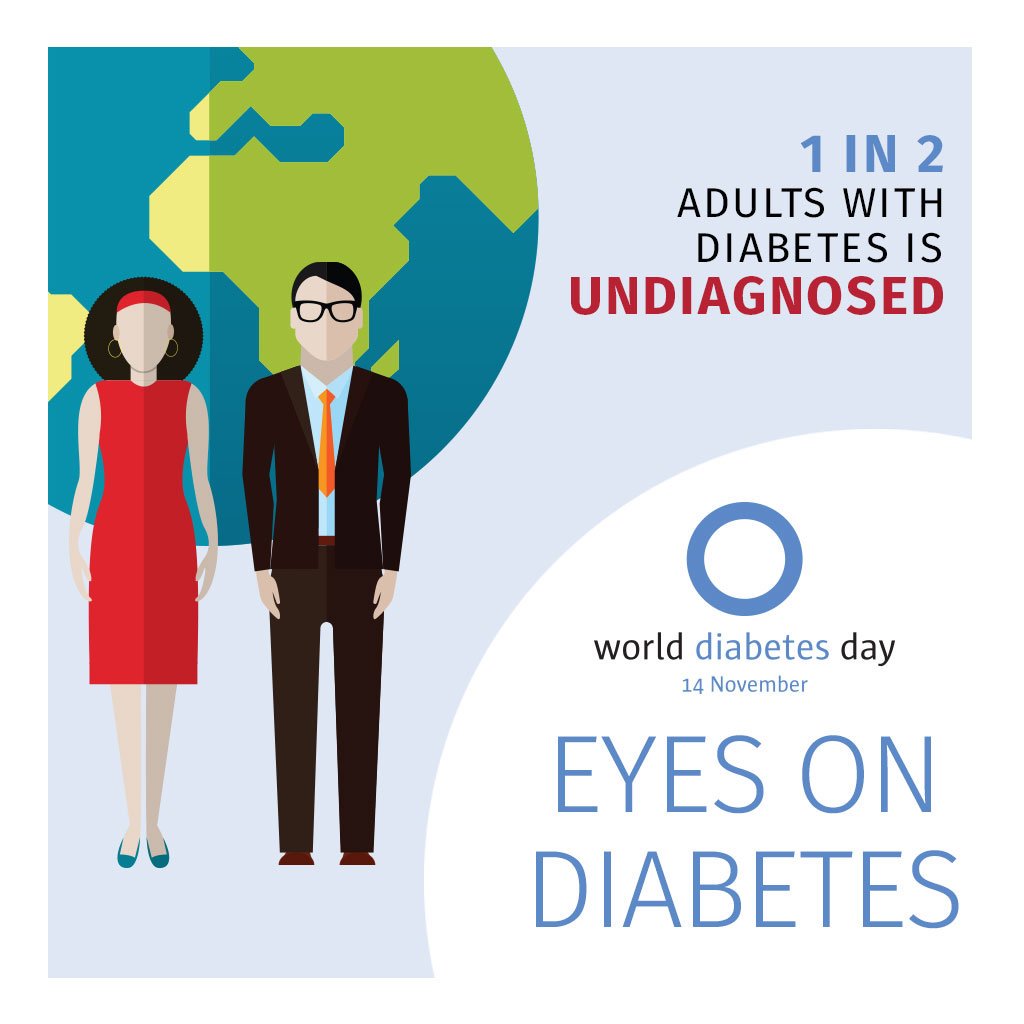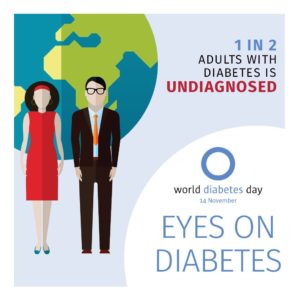Eyes on Diabetes
The theme of World Diabetes Day 2016 is Eyes on Diabetes. The year’s activities and materials will focus on promoting the importance of screening to ensure early diagnosis of type 2 diabetes and treatment to reduce the risk of serious complications.
- Screening for type 2 diabetes is important to modify its course and reduce the risk of complications.
- Diabetes is a huge and growing burden: 415 million adults were living with diabetes in 2015 and this number is expected to increase to around 642 million or one in ten adults by 2040.
- One in two adults with diabetes is undiagnosed.
- Many people live with type 2 diabetes for a long period of time without being aware of their condition. By the time of diagnosis, diabetes complications may already be present.
- Up to 70% of type 2 diabetes cases can be prevented or delayed by adopting healthier lifestyles, equivalent to up to 160 million cases by 2040.
- With increasing levels of poor nutrition and physical inactivity among children in many countries, type 2 diabetes in childhood has the potential to become a global public health issue leading to serious health outcomes.
- 12% of total global expenditure on health is currently spent on adults with diabetes.
- The number of people with diabetes in low- and middle-income countries will continue to grow, posing a threat to sustainable development. For example by 2040, the number of people with diabetes in Africa is expected to double.
- Screening for diabetes complications is an essential part of managing all types of diabetes.
- One in two people with diabetes remain undiagnosed, which makes them particularly susceptible to the complications of the condition, causing substantial disability and premature death.
- More than 640 million of us may be living with diabetes by 2040. Delayed diagnosis means that many people with type 2 diabetes will suffer from at least one complication by the time they are diagnosed with diabetes.
- In many countries diabetes is a leading cause of blindness, cardiovascular disease, kidney failure and lower-limb amputation.
- More of us will develop and live with type 1 diabetes. Screening for diabetes complications is an important part of effective management of the disease, to ensure optimal health.
- Of the 415 million adults worldwide living with diabetes in 2015,1 over one third will develop some form of diabetic retinopathy – a complication of diabetes that can lead to vision impairment and blindness.
- More than 93 million adults, or one in three, currently living with diabetes have diabetic retinopathy.
- The management of diabetes and its complications begins in primary health care and this should include screening for diabetic retinopathy
- Early detection and timely treatment of diabetic retinopathy can prevent vision loss and reduce the impact of diabetes on individuals, their carers and society.
- Careful management of diabetes and screening for diabetic eye disease can help prevent visual impairment and blindness.
- Global health spending to treat diabetes and manage complications was estimated at e USD 673 billion in 2015.


What you need to know about Oral Cancer
What you need to know about Oral Cancer People are affected by oral cancer all the time, whether it occurs in the neck, on your lip or in your gums. Knowing the causes, symptoms and how to prevent oral cancer are all very important to know and be aware of. In this...

Diabetes and Oral Health
Are diabetes and dental problems related? Yes, the two are very much related in the sense that if it has been determined that you have diabetes then you're more than likely at a risk for developing oral health problems, especially gum disease. Did you know that...

All you need to know about Wisdom Teeth
All you need to know about Wisdom Teeth We've all heard about wisdom teeth but do you know everything about them? Read this article to learn more about wisdom teeth as we answer some commonly asked questions about them for you. What are wisdom teeth? The third and...

